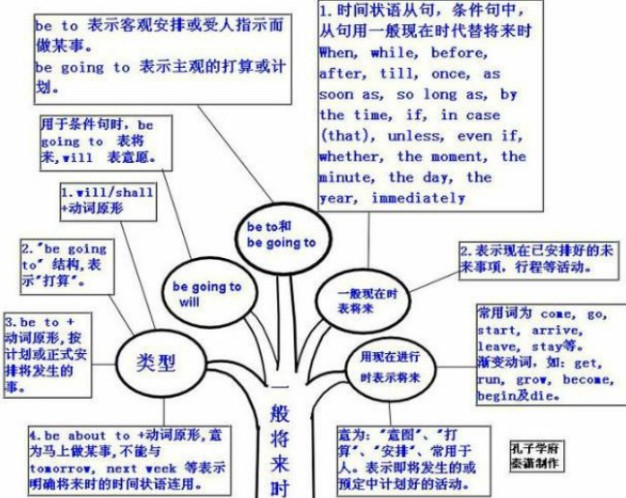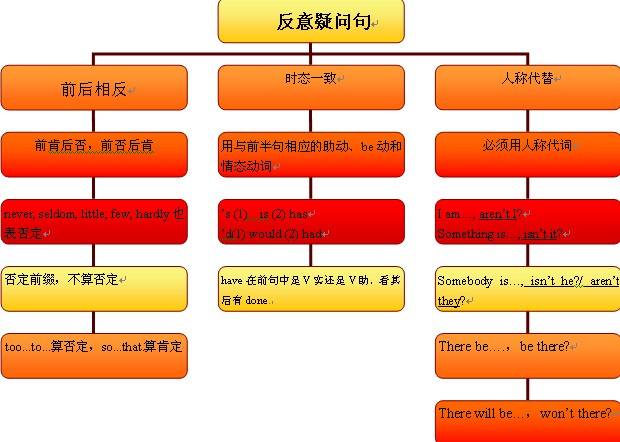本试题 “Don’t interrupt while other student is speaking, ______? [ ]A. will youB. do youC. won’t youD. don’t you” 主要考查您对一般将来时
反意疑问句
等考点的理解。关于这些考点您可以点击下面的选项卡查看详细档案。
- 一般将来时
- 反意疑问句
一般将来时的概念:
一般将来时表示将来某一时刻的发生动作或状态,或将来某一段时间内经常的动作或状态。常与表示将来的时间状语连用。
一般将来时用法:
1)shall用于第一人称,常被will所代替。will在陈述句中用于各人称,在征求意见时常用于第二人称。
例如:Which paragraph shall I read first?我先读哪一段呢?
Will you be at home at seven this evening? 今晚七点回家好吗?
2)be going to+不定式,表示将来。
a. 主语的意图,即将做某事。
例如:What are you going to do tomorrow? 明天打算作什么呢?
b. 计划,安排要发生的事。
例如:The play is going to be produced next month。这出戏下月开播。
c. 有迹象要发生的事。
例如:Look at the dark clouds, there is going to be a storm. 看那乌云,快要下雨了。
3)be+不定式表将来,按计划或正式安排将发生的事。
例如:We are to discuss the report next Saturday. 我们下星期六讨论这份报告。
4)be about to+不定式,意为马上做某事。
例如:He is about to leave for Beijing. 他马上要去北京。
注意:be about to do不能与tomorrow, next week 等表示明确将来时的时间状语连用。
一般将来时知识体系:

一般现在时表将来:
1)下列动词come, go, arrive, leave, start, begin, return的一般现在时可以表示将来,主要用来表示在时间上已确定或安排好的事情。
例如:The train leaves a tsix tomorrow morning. 火车明天上午六点开。
—When does the bus star? 汽车什么时候开?
—It stars in ten minutes. ?十分钟后。
2)以here, there等开始的倒装句,表示动作正在进行。
例如:Here comes the bus.=The bus is coming. 车来了。
There goes the bell.=The bell is ringing. 铃响了。
3)在时间或条件句中。
例如:When Bill comes(不是will come), ask him to wait for me. 比尔来后,让他等我。
I'll write to you as soon as I arrive there. 我到了那里,就写信给你。
4)在动词hope, take carethat,makesurethat等的宾语从句中。
例如:I hope they have a nice time next week. 我希望他们下星期玩得开心。
Make sure that the windows are closed before you leave the room. 离开房间前,务必把窗户关了。
现在进行时表示将来:
下列动词come, go, arrive, leave, start, begin, return等现在进行时可以表示将来。
例如:I'm leaving tomorrow. 明天我要走了。
Are you staying here till next week? 你会在这儿呆到下周吗?
反意疑问句的概念:
表示提问人的看法,没有把握,需要对方证实。
反意疑问句由两部分组成:前一部分是一个陈述句,后一部分是一个简短的疑问句,两部分的人称时态应保持一致。
1、陈述部分肯定式+疑问部分否定式,可记为前肯后否。
2、陈述部分否定式+疑问部分肯定式,可记为前否后肯。
例如:This pencil is red, isn't it? Yes, it is. / No, it isn't.
This pencil isn't red, is it? Yes, it is. / No, it isn't.
反意疑问句类型:
1)陈述部分的主语是I,疑问部分要用aren't I.
如:I'm as tall as your sister, aren't I?
2)陈述部分的谓语是wish,疑问部分要用may+主语。
如:I wish to have a word with you, may I?
3)陈述部分用no, nothing, nobody, never, few, seldom, hardly, rarely, little等否定含义的词时,疑问部分用肯定含义。
如:The Swede made no answer, did he/she?
Some plants never blown(开花), do they?
4)含有oughtto的反意疑问句,陈述部分是肯定的,疑问部分用shouldn't/oughtn't+主语。
如:He ought to know what to do,oughtn't he?/shouldn't he?
5)陈述部分有have to+v.(had to+v.),疑问部分常用don't+主语(didn't+主语)。
如:We have to get there at eight tomorrow, don't we?
6)陈述部分的谓语是usedto时,疑问部分用didn't+主语或usedn't+主语。
如:He used to take pictures there, didn't he?/usedn't he?
7)陈述部分有had better+v. 疑问句部分用hadn't you?
如:You'd better read it by yourself, hadn't you?
8)陈述部分有would rather+v.,疑问部分多用wouldn't+主语。
如:He would rather read it ten times than recite it, wouldn't he?
9)陈述部分有You'd like to+v.疑问部分用wouldn't+主语。
如:You'd like to go with me, wouldn't you?
10)陈述部分有must的疑问句,疑问部分根据实际情况而定。
如:He must be a doctor, isn't he?
You must have studied English for three years, haven't you?/didn't you?
He must have finished it yesterday, didn't he?
反意疑问句用法总结:
| 陈述部分的谓语 | 疑问部分 |
| I' | aren’t I |
| wish | may + 主语 |
| no, nothing, nobody, never, few, seldom, hardly, rarely, little等否定含义的词 | 肯定含义 |
| ought to(肯定的) | shouldn't/ oughtn't +主语 |
| have to+v.(had to+v.) | don't +主语(didn't +主语) |
| used to | didn't +主语或 usedn't +主语 |
| had better + v. | hadn't you |
| would rather + v. | wouldn't +主语 |
| you'd like to + v. | wouldn't +主语 |
| must | 根据实际情况而定 |
| 感叹句中 | be +主语 |
| neither…nor, either…or 连接的并列主语 | 根据其实际逻辑意义而定 |
| 指示代词或不定代词everything, that, nothing, this | 主语用it |
| 并列复合句 | 谓语根据邻近从句的谓语而定 |
| 定语从句,宾语从句的主从复合句 | 根据主句的谓语而定 |
| think, believe, expect, suppose, imagine等引导 | 与宾语从句相对应的从句 |
| everybody, anyone, somebody, nobody, no one | 复数they, 单数he |
|
情态动词dare或need dare, need 为实义动词 |
need (dare ) +主语 do +主语 |
|
省去主语的祈使句 Let's 开头的祈使句 |
will you?shall we? |
| there be | 相应的谓语动词+there(省略主语代词) |
| 否定前缀不能视为否定词 | 仍用否定形式 |
| must表"推测" | 根据其推测的情况来确定反意疑问句 |
反意疑问句特殊用法点拨:
1、感叹句中,疑问部分用be+主语。
如:What colours, aren't they?
What a smell, isn't it?
2、陈述部分由neither...nor, either...or 连接的并列主语时,疑问部分根据其实际逻辑意义而定。
如:Neither you nor I am engineer, are we?
3、陈述部分主语是指示代词或不定代词everything, that, nothing, this,疑问部分主语用it。
如:Everything is ready, isn't it?
4、陈述部分为主语从句或并列复合句,疑问部分有三种情况:
a.并列复合句疑问部分,谓语动词根据邻近从句的谓语而定。
如:Mr. Smith had been to Bei jing for several times, he should have been in China now, shouldn't he?
b.带有定语从句,宾语从句的主从复合句,疑问部分谓语根据主句的谓语而定。
如:He is not the man who gave us a talk, is he?
He said he wanted to visit Japan, didn't he?
c.上述部分主句谓语是think, believe, expect, suppose, imagine等引导的定语从句,疑问部分与宾语从句相对应构成反意疑问句。
如:I don't think he is bright, is he?
We believe she can do it better, can't she?
5、陈述部分主语是不定代词everybody, anyone, somebody, nobody, noone等,疑问部分常用复数they,有时也用单数he。
如:Everyone knows the answer, don't they?(doeshe?)
Nobody knows about it, do they?(doeshe?)
6、带情态动词dare或need的反意疑问句,疑问部分常用need(dare)+主语。
如:We need not do it again, need we?
He dare not say so,dare you? 当dare, need为实义动词时,疑问部分用助动词do+主语。
如:She doesn't dare to go home alone, does she?
7、省去主语的祈使句的反意疑问句,疑问部分用will you。
如:Don't do that again, will you?
Go with me, will you/won't you? 注意:Let's开头的祈使句,后用shall we? Let us开头的祈使句,后用will you?
如:Let's go and listen to the music, shall we?
Let us wait for you in the reading-room, will you?
8、陈述部分是"therebe"结构的,疑问部分用there省略主语代词。
如:There is something wrong with your watch, isn't there?
There will not be any trouble, will there?
9、否定前缀不能视为否定词,其反意疑问句仍用否定形式。
如:It is impossible, isn't it?
He is not unkind to his classmates, is he?
10、must在表"推测"时,根据其推测的情况来确定反意疑问句。
如:He must be there now, isn't he?
It must be going to rain tomorrow, won't it?
反意疑问句知识体系:

复合句的反意疑问句:
1、当陈述部分是一个(带that引导宾语从句的)主从复合句时,附加疑问句的主谓要和主句的主谓保持对应关系。但是,当陈述部分的主语是:I suppose, I think, I believe, I imagine, I expect等结构时,附加疑问句的主语和谓语要和从句的主语,谓语保持一致关系。而且要注意到否定的转移问题。
如:I think there is something wrong with the washer, isn't there?
We don't suppose he cares, does he?
2、当陈述部分是I'm sure that;we are sure;I'm afraid that;We are sure that;I feel sure that等后面跟宾语从句时,反意疑问句与后面的宾语从句一致。
3、当陈述部分是并列句时,附加疑问句的主谓语要和离它最近的句子的主谓保持对应关系。
如:We must redouble our efforts, or we'll not be able to catch up with the others, will we?
与“Don’t interrupt while other student is speaking, ______? ...”考查相似的试题有:
- —Be careful! That truck_____you!—Thanks for warning me![ ]A. hitsB. has hitC. hitD. is going to hit
- Why don’t you put the meat in the fridge ? It will _____ fresh for several days.A.be stayedB.stayC.be stayingD.ha...
- — Mom, the door ____. My keys are locked in it again.— You ____ it! I told you always to carry your keys with you.[ ]...
- Bill's aim is to inform the viewers that cigarette advertising on TV is illegal, _____?A. isn't itB. is itC. isn't he...
- ----Mr. Li told me once he had a fall and broke his leg .----_______was that.A Since when B For how long C How long a...
- I told them not everybody could run as fast as you did, ______?A.could heB.didn't IC.didn't youD.couldn’t they
- — I don’t think he is studying English in his room now.— Oh! ________?A.Does heB.Doesn’t heC.Is heD.Isn’t he
- We believe she can win the game, ______?A.don’t weB.do weC.can weD.can’t she
- Nothing he did was helpful to solve this problem, _______?A.didn’t heB.was itC.wasn’t itD.did he
- It is good news to us that we are invited to such a great concert, _____?[ ]A. is itB. isn't itC. are weD. aren't we